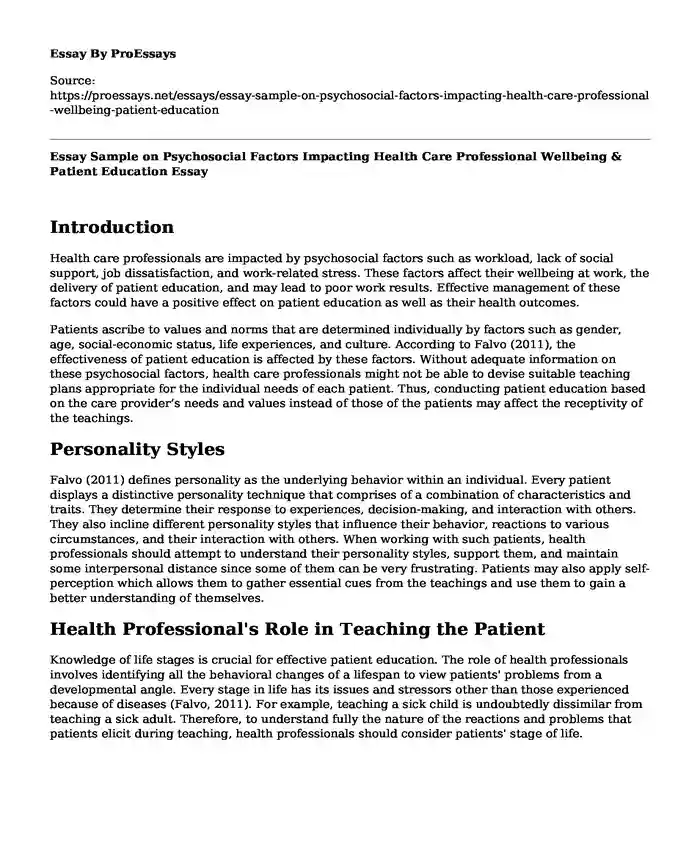Introduction
Health care professionals are impacted by psychosocial factors such as workload, lack of social support, job dissatisfaction, and work-related stress. These factors affect their wellbeing at work, the delivery of patient education, and may lead to poor work results. Effective management of these factors could have a positive effect on patient education as well as their health outcomes.
Patients ascribe to values and norms that are determined individually by factors such as gender, age, social-economic status, life experiences, and culture. According to Falvo (2011), the effectiveness of patient education is affected by these factors. Without adequate information on these psychosocial factors, health care professionals might not be able to devise suitable teaching plans appropriate for the individual needs of each patient. Thus, conducting patient education based on the care provider’s needs and values instead of those of the patients may affect the receptivity of the teachings.
Personality Styles
Falvo (2011) defines personality as the underlying behavior within an individual. Every patient displays a distinctive personality technique that comprises of a combination of characteristics and traits. They determine their response to experiences, decision-making, and interaction with others. They also incline different personality styles that influence their behavior, reactions to various circumstances, and their interaction with others. When working with such patients, health professionals should attempt to understand their personality styles, support them, and maintain some interpersonal distance since some of them can be very frustrating. Patients may also apply self-perception which allows them to gather essential cues from the teachings and use them to gain a better understanding of themselves.
Health Professional's Role in Teaching the Patient
Knowledge of life stages is crucial for effective patient education. The role of health professionals involves identifying all the behavioral changes of a lifespan to view patients' problems from a developmental angle. Every stage in life has its issues and stressors other than those experienced because of diseases (Falvo, 2011). For example, teaching a sick child is undoubtedly dissimilar from teaching a sick adult. Therefore, to understand fully the nature of the reactions and problems that patients elicit during teaching, health professionals should consider patients' stage of life.
Conclusion
Finally, family regularly assists patients in making vital decisions regarding their health. Falvo (2011) claimed that the support and attitudes of the family have great impact on the magnitude of patients’ adherence to health advice. They may affect the degree to which patients adhere to treatment advice which determines if they take their medication or not. Family may also help by providing functional support to the patient by helping them comply with the guidance and treatment procedures. Health professionals should include the family in patient teaching and enlist them as a support system to help the patient follow the medical advice.
References
Cherry, M. J. (2015). Re-thinking the role of the family in medical decision-making. Journal of Medicine and Philosophy, 40(4), 451-472.
https://doi.org/10.1093/jmp/jhv011
Falvo, D. R. (2011). Effective Patient Education: A Guide to Increased Adherence (4thed.).
Cite this page
Essay Sample on Psychosocial Factors Impacting Health Care Professional Wellbeing & Patient Education. (2023, Oct 04). Retrieved from https://proessays.net/essays/essay-sample-on-psychosocial-factors-impacting-health-care-professional-wellbeing-patient-education
If you are the original author of this essay and no longer wish to have it published on the ProEssays website, please click below to request its removal:
- Advanced Professional Roles and Values: Nursing Essay
- Paper Example on Overconfidence
- High Employee Turnover in the Automotive Industry Paper Example
- Essay Sample on Dementia and Nursing Home Care Setting
- Vitality Health Enterprises Incorporated Management Accounting Case Study
- Research Paper on AI in Pharma: Unlocking Scientific Breakthroughs Through Machine Learning
- Realizing Global Interconnectedness: A Journey From Ignorance to Awareness - Essay Sample







